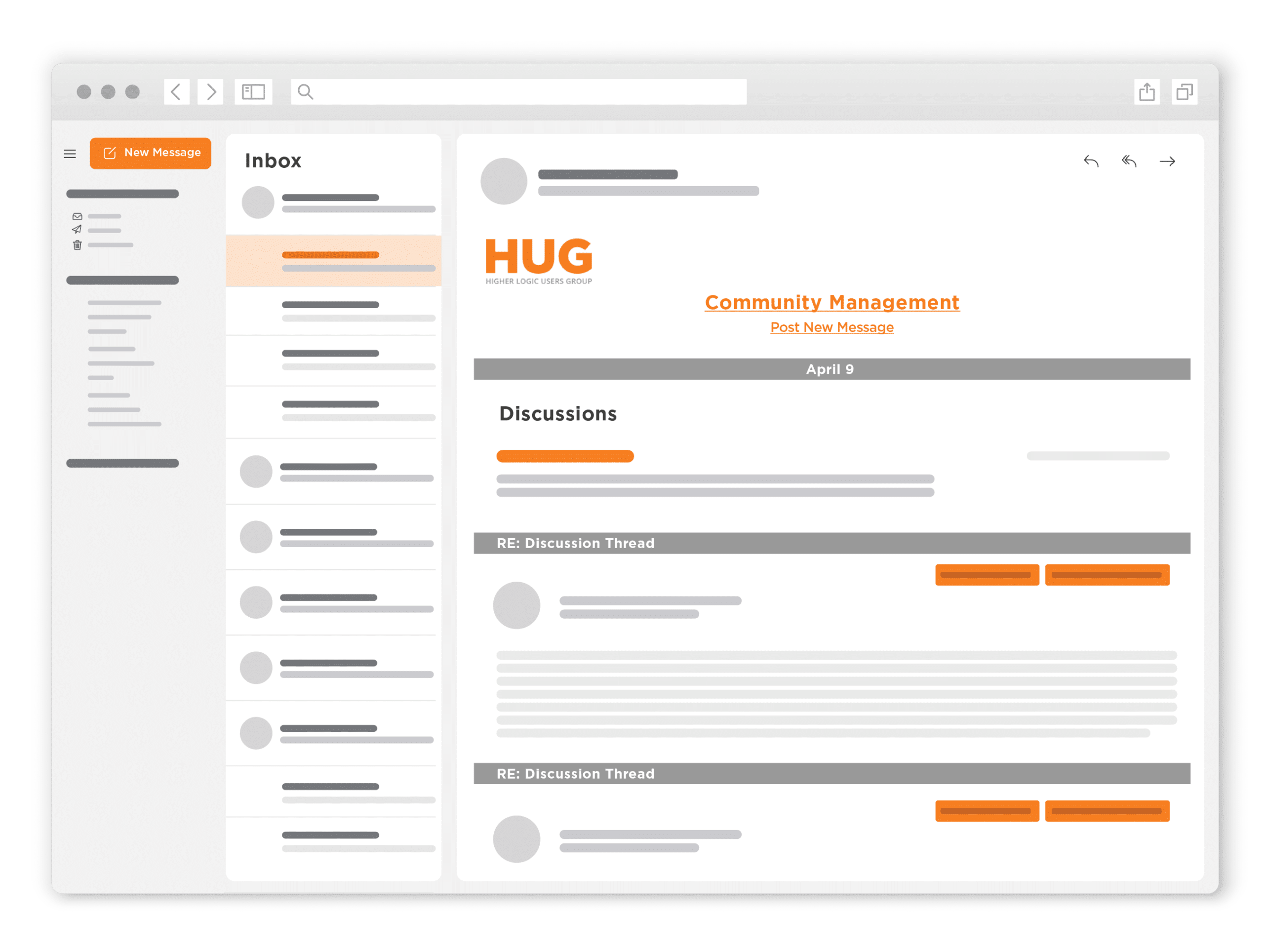
15 min read
Path to Renewal: Mentoring and Volunteering
Tags: Member Engagement,Member Retention,Professional Associations,Trade Associations
Member Involvement Creates Member Engagement
As we’ve discussed throughout the Path to Renewal series, fostering member engagement is not merely a goal for associations but a strategic imperative. Higher Logic’s 2023 Association Member Experience Report showed that the top reason members consider leaving their association is a lack of engagement.
Robust mentoring programs and volunteer programs offer yet another way to push members up the engagement ladder and keep them coming back to your association.
While these initiatives certainly create feel-good opportunities for members to give back to their respective fields and achieve a sense of accomplishment and pride, they also represent key career advancement pathways. The networking components embedded in mentoring relationships and volunteer programs (like committee participation or event volunteer roles) support multifaceted member growth. Through mentoring and volunteering, members forge connections with peers and become more deeply connected with their field. These relationships and experiences propel members upward in their careers, fostering a tangible link between their professional success and the association, which transforms engaged members into fervent advocates for the organization. And for new members, having a mentor often serves as a pivotal first step towards a more enduring engagement.
As with member onboarding, events, and your overall member engagement strategies, it’s important to create layered support for your mentor and/or volunteer programs across all your available channels.
Community
Communication & Resources
Create a sense of continuity and accountability with dedicated volunteer and/or mentoring communities. A community platform like Higher Logic Thrive (which offers volunteer management and mentor matching tools) is the ideal place to collect volunteer and mentor applications, conduct onboarding, facilitate ongoing communication among volunteers and mentors/mentees, and share resources and tips for mentoring and volunteering in a resource library.

Incentives & Awareness
Celebrate and reward mentors/mentees and volunteers with community announcements, volunteer leaderboards, and special community badges or ribbons. Some associations also share mentor/mentee interviews or volunteer highlights on their community blog.

Updates & Opportunities
Publicize upcoming volunteer opportunities on your community homepage with quicklinks and/or event calendars. Host virtual events or Q&As related to volunteering and mentoring within the online community to allow members to learn more about opportunities and ask questions in real time.

Process Management & Record Keeping
You can use your online community to keep your staff and volunteer committees (e.g. board, membership committees, etc.) organized too! Communities are a great place to store committee resources and host group discussions that you can refer back to.

Communication is key to the success of your volunteering and mentoring programs – both for recruiting new participants and keeping existing participants informed and engaged. You can use email to foster a sense of community, responsibility, and FOMO (fear of missing out). Some ideas you can try include:
Targeted Recruitment Campaigns & Invitations
Craft personalized email campaigns to specific segments of your membership (e.g. telling members attending an upcoming event about related volunteer opportunities or sending new members an invitation to find a mentor and long-time members an invitation to share their experience). Clearly communicate the impact they can make and how it aligns their professional goals.
Regular Program Updates
Keep mentoring and volunteering programs top-of-mind by sharing regular email updates or including your volunteering and mentoring programs in your newsletter. Tap into the emotional side of things by highlighting recent success stories or volunteer impacts and celebrating participating members. And make sure to let members know about upcoming opportunities to get involved.
Onboarding & Training
Provide mentors and volunteers with training materials, guidelines, and resources – even step-by-step instructions - to help them get started and facilitate their success. Ensure they are well-equipped for their roles, enhancing the overall effectiveness of the programs.
Calendar Reminders
Send calendar reminders for scheduled mentoring sessions, volunteer events, or training sessions. Timely reminders help participants stay organized and committed to their roles.
Feedback Surveys
Solicit feedback from participants through email surveys. Use this valuable input to assess the program's effectiveness, identify areas for improvement, and make data-driven adjustments.
Program Overview and Benefits: Clearly outline the goals, benefits, and impact of volunteering and mentoring programs, emphasizing their contribution to professional growth and community engagement. Make sure you’re explicit and clear about expectations, qualifications, deadlines, and incentives.
How to Get Involved: Provide a user-friendly guide outlining steps for members to join, whether for volunteer opportunities or mentoring. Include clear calls-to-action, readily obvious deadlines, and links to sign-up forms.
Link to Resource Hub: Centralize training materials, guidelines, and best practices in an accessible resource hub (for example, on your online community) to support both volunteers and mentors in their roles.
Success Stories and Testimonials: Showcase real-life success stories and testimonials from program participants to inspire new members and demonstrate the tangible impact of the programs.
Program Calendar & Events: Display a calendar with upcoming volunteer opportunities, mentoring events, and program-related activities to help members plan their involvement and stay engaged. This can be hosted on your online community for added visibility!

Measuring Success
An important part of starting a volunteer and/or mentoring program is taking the time to identify your goals and key performance indicators (KPIs) so you can evaluate the success of the program over time.
- For your mentoring program, you might think about program-specific metrics (number of mentor/mentee pairs, satisfaction of members) or business metrics (program’s effect on member retention, member acquisition).
- For your volunteer program, you might ask yourself who to involve, what activities you need support for, and why the program supports your mission.
When it’s time to measure the performance of your programs, remember to go back to your goals – are you meeting the objectives you set for your volunteering or mentoring programs? Some metrics you might consider tracking include:

Participant Satisfaction
Implement surveys or feedback mechanisms to gauge the satisfaction of participants. Assess their overall experience, the meaningfulness of their contributions, and their perception of the value gained from participating in the volunteer program.

Retention Rates
Track the retention rates of participants within the association over time. A successful mentoring program should retain participants throughout the length of their commitment and contribute to member retention, indicating that participants find value in their involvement and are more likely to stay engaged with the association.

Diversity & Inclusion
Assess the diversity of participation within the program and within the association. Track the representation of various demographic groups among mentees, mentors, volunteers, members, event attendees, and the wider field. A successful program should contribute to a more diverse and inclusive professional community.
Program Engagement
Are participants actively engaged in their mentoring or volunteering program? And how has their participation impacted overall member engagement? Track how participation correlates with increased attendance at events, committee involvement, or other association activities. Successful mentoring and volunteering programs contribute to a sense of community and affinity among members.

Program Impact
For volunteer opportunities, measure the impact of volunteers' contributions. This could include quantifiable outcomes such as the number of events supported, projects completed, or the hours volunteered. Assessing the tangible results of volunteer efforts provides insight into the program's effectiveness. For mentoring, do your best to measure the impact on the field. Are more people staying in the industry?

Member Advancement
Evaluate the career and leadership progression of participants from your volunteer and mentoring programs. Are participants continuing to get involved with the organization and take on leadership roles? Are they achieving promotions, job changes, or skill development? A successful program should contribute positively to mentees' career trajectories and engagement with the association.
Volunteering and Mentoring Programs Cultivate Engagement and Dedication
The symbiotic relationship between mentoring and volunteering programs supports vibrant associations and deeply engaged members. Through these initiatives, associations not only provide avenues for members to actively contribute to their professional communities but also establish vital connections that transcend traditional networking. The impact resonates beyond the tangible outcomes, influencing member satisfaction, retention rates, and the overall sense of belonging.
Mentoring programs offer a structured pathway for knowledge transfer and career development, helping the association’s wider industry retain individuals in the field. Volunteering opportunities empower members to contribute meaningfully to the association’s mission. Together, these programs create shared experiences, skill-sharing, and mutual support, culminating in associations that are a true professional “home” for their members and thrive on the enthusiasm and dedication of their engaged membership.

Additional Resources
Volunteer Engagement Success Kit
Volunteer programs help drive member engagement and association success. Learn how to build a thriving volunteer program.
A mentoring program can be a top member benefit that helps your organization cultivate member engagement. Learn how to nurture member connections and growth.

The Guide to Member Retention
24% of associations don’t have a tactical plan to increase engagement, and 29% think members forget to renew. Check out the rest of our Path to Renewal series to learn how you can drive engagement and retention with strong member onboarding, email tactics, community, and more.

